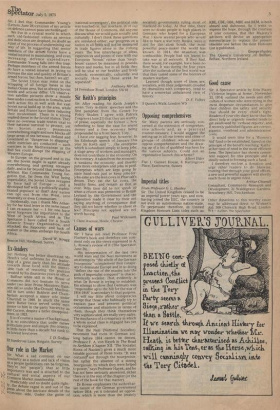Causes of wars
Sir: I have not read Professor Fritz Fischer's book and therefore can comment only on the views expressed in A. L. Rowse's review of it (The Spectator, June 28).
His interpretation of the last two world wars and the Nazi movement as an attempt by "the whole of the German bourgeoisie" to implement their conspiracy to dominate Europe and in so doing "deflect the rise of the massses into the path of imperialist conquest" is characteristically socialist. That, evidently, is what Dr Rowse is trying to establish. His attempt to show that Germany was "responsible up to the hilt for the war of 1914-1918" is secondary to that purpose.
I will say little about conspiracies except that those who habitually try to explain past and present political occurrences and situations in terms of them, though they think themselves very sophisticated, are really very naiVe. The mechanics of a conspiracy in which a whole social class is engaged has yet to be explained.
That the Nazi (National Socialist) movement had roots in German soil long before 1914 cannot be denied. Professor F. A. von Hayek in The Road to Serfdom (Chapter XII: 'The Socialist Roots of Nazism') gives a much more tenable account of those roots. "It was certainly' not through the bourgeoisie, but rather the absence of a strong bourgeoisie, by which they were helped to power," says Professor Hayek; and he has not been seriously answered, either there or in the rest of the chapter (or the rest of the book for that matter).
Dr Rowse emphasises the authoritarian nature of the German government before 1914; yet it tolerated an opposition, which is more than the (mainly socialist) governments ruling most of mankind do today. At that time, there were no doubt people in high places in Germany who hoped for a European War. I know several people who would like to have a war with Russia, were it not for the atom bomb, the most powerful peace-maker the world has known. In 1914, the situation was combustible. People had not learnt to take war at all seriously. If they had, there would, for example, have been no Boer War. It was during the four years after the outbreak of the first World war that they tasted some of the horrors of modern warfare.
Learned though some of them are, socialists, with their judgement clouded by obsessions with conspiracy, tend to have a somewhat unbalanced view of history.
D. E. Foilzes 5 Queen's Walk, London W5


































 Previous page
Previous page